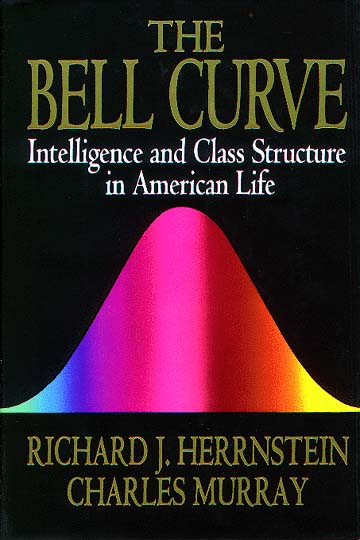
"I think that the number of novels, songs, and paintings done since 1950 that anyone will still care about 200 years from now is somewhere in the vicinity of zero. Not exactly zero, but close. I find a good way to make this point is to ask anyone who disagrees with me to name a work that will survive -- and then ask, "Seriously?" Very few works indeed can defend themselves against the "Seriously?" question." Charles Murray served as a Peace Corps Volunteer in Thailand in the 1960's.
Q&A with Charles Murray on Human Accomplishment
Q&A with Charles Murray on Human Accomplishment
by Steve Sailer
UPI, October 16, 2003
[My long review of Charles Murray's new book appeared in the Nov. 3rd issue of The American Conservative.]
Once a decade, Charles Murray drops a bombshell book on American intellectual life.
In 1984, it was his devastating assessment of welfare programs, "Losing Ground," which helped inspire the famous 1996 welfare reform act.
In 1994, Murray coauthored with the late Richard J. Herrnstein the enormous bestseller "The Bell Curve." It ignited controversy by arguing that IQ scores are one of the most overlooked tools for understanding how American society is structured.
Now, after a half-decade of work, Murray, a scholar with the American Enterprise Institute, is back with another massive book, 688 pages full of graphs and tables. "Human Accomplishment: The Pursuit of Excellence in the Arts and Sciences, 800 B.C. to 1950" (HarperCollins, $29.95) is a fascinating attempt to rank the 4,000 most important artists and scientists in human history.
Murray meticulously measured how much attention the leading scholars in their fields pay to the top creators and discoverers. Reading "Human Accomplishment" is a little like browsing through the statistics-laden "Baseball Encyclopedia," except that instead of being about Ruth, Di Maggio, and Bonds, Murray's book is about Picasso, Darwin, and Edison.
Murray took some time to discuss with United Press International "Human Accomplishment," which is scheduled for release on Oct. 21.
Q. Who came out on top of big categories like Western Literature, Western Art, Western Philosophy, and Combined Sciences?
A. Shakespeare, Michelangelo, Aristotle, and Newton -- the people you'd expect.
In Western music, Mozart and Beethoven were in a dead heat, with Bach third. A rather vocal minority is upset about Bach not being on top. I'm not. I love Bach, but it's awfully hard to listen to Beethoven's later symphonies and string quartets and figure out how anybody could possibly be ranked above him.
However, let me stress: I'm not the one who made those decisions. And occasionally I had to grin and bear it when things didn't come out according to my druthers. Rousseau and Byron are way too high in Western literature for my taste, for example.
Q. Can you truly quantify objectively which artists and scientists were the most eminent?
A. Sure. It's one of the most well-developed quantitative measures in the social sciences. (The measurement of intelligence is one of its few competitors, incidentally.)
My indices have a statistical reliability that is phenomenal for the social sciences. There's also a very high "face validity" -- in other words, the rankings broadly correspond to common-sense expectations.
Q. Who was the most accomplished person who ever lived?
A. Now we're talking personal opinion, because the methods I used don't work across domains, but I have an emphatic opinion.
Aristotle.
He more or less invented logic, which was of pivotal importance in human history (and no other civilization ever came up with it independently). He wrote the essay on ethics ("Nicomachean Ethics") that to my mind contains the bedrock truths about the nature of living a satisfying human life. He made huge contributions to aesthetics, political theory, methods of classification and scientific observation. Who else even comes close?
Q. You reject postmodernist reinterpretations and stick to traditional histories, chronologies, and biographical dictionaries as the sources for your data. Are there any postmodern works that could have provided an alternative list of names?
A. Not that I know of. It would be internally contradictory for a postmodernist history of art, let's say, to devote space according to objective merit, wouldn't it? What would be its rationale for allocating more space to Michelangelo than to Grandma Moses? If you're a devout postmodernist, surely you couldn't believe that Michelangelo was "better" than Grandma Moses?
Q. Which woman scored the highest?
A. Murasaki Shikibu, who wrote the novel "The Tale of Genji" a thousand years ago, has by far the highest index score -- 86 on a scale of 1 to 100. But, that is in competition just with other Japanese authors, not all of the world's authors.
The highest-scoring woman in any of the sciences -- no surprise -- is Marie Curie in Physics, with a score in the 40s (on a scale where Newton and Einstein are tied at 100). The highest in Western Literature is Virginia Woolf. None of the highest-scoring women in the other categories are major figures.
Q. You pay a surprising amount of attention to Asian culture. Does that stem from the six years you lived in Asia beginning as a Peace Corps volunteer?
A. Put it this way: There are aspects of Asian culture as it is lived that I still prefer to Western culture, 30 years after I last lived in Thailand. Two of my children are half-Asian. Apart from those personal aspects, I have always thought that the Chinese and Japanese civilizations had elements that represented the apex of human accomplishment in certain domains.
When I began the book, I actually hoped to give Asian accomplishment a still larger place than it wound up getting.
Q. Why did you end up with mostly Dead White European Males in your inventory of 4,002 significant figures?
A. That's what happens when you employ the methods I used. And as I spend many pages in the book describing in perhaps excessive detail, those methods are not skewed by Western sources that are unfairly oblivious to non-Western accomplishment.
Q. You argue that one big reason that most of humanity's highest achievers came from what used to be called Christendom was ... Christianity. Did you expect to reach that conclusion?
A. Michael Novak foretold I would come to that conclusion, but I didn't agree at the time. I didn't think you needed anything except the Greek heritage and some secular social and economic trends to explain the Renaissance.
On this score, I have plenty of witnesses in the form of my colleagues who were getting nervous as the years went by. They kept asking me what the thesis of the book was, and I kept saying, "Beats the hell out of me."
The last chapters of the book were all written in the last nine months of work, and at the beginning of those nine months, I still didn't know what was going to be in them.
Q. You found that per capita levels of accomplishment tended to decline from 1850 to 1950. Would you care to speculate on post-1950 trends?
A. I think that the number of novels, songs, and paintings done since 1950 that anyone will still care about 200 years from now is somewhere in the vicinity of zero. Not exactly zero, but close. I find a good way to make this point is to ask anyone who disagrees with me to name a work that will survive -- and then ask, "Seriously?" Very few works indeed can defend themselves against the "Seriously?" question.
[I asked my readers to suggest works of art from post-1950 that could withstand the "Charles Murray Challenge." The nominations are here.]
[My long review of Charles Murray's new book appeared in the Nov. 3rd issue of The American Conservative.]












